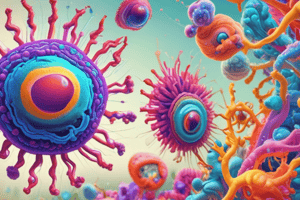Podcast
Questions and Answers
What are the three main types of cells?
What are the three main types of cells?
Prokaryotic and eukaryotic
How are eukaryotic cells further categorized?
How are eukaryotic cells further categorized?
Animal and plant cells
What is the fundamental unit of life?
What is the fundamental unit of life?
Cells
What are organs?
What are organs?
Name an example of an organ involved in circulation.
Name an example of an organ involved in circulation.
Why is understanding cells important in biology?
Why is understanding cells important in biology?
What is ecology focused on at the macro level?
What is ecology focused on at the macro level?
How does evolution help explain the diversity of species observed today?
How does evolution help explain the diversity of species observed today?
What are some exciting areas of ongoing research in biology?
What are some exciting areas of ongoing research in biology?
What does microbiology focus on?
What does microbiology focus on?
What does genetics aim to elucidate?
What does genetics aim to elucidate?
What is the goal of systems biology?
What is the goal of systems biology?
Flashcards are hidden until you start studying
Study Notes
The Vibrant World of Biology
Biology, the science of living organisms, their interactions, and the environment, offers an intriguing glimpse into the workings of nature. From the minuscule processes occurring within a single cell to the grand scale of ecosystems and global cycles, biology provides us with essential insights into the world around us. This article explores various aspects of biology, offering a comprehensive yet accessible introduction to this diverse discipline.
The Building Blocks of Life: Cells
Cells, the fundamental unit of life, serve as the building blocks for all living organisms. They come in three main types: prokaryotic (found in bacteria) and eukaryotic (present in animals, plants, fungi, and protists). Eukaryotic cells are further divided into animal and plant cells due to differences in their internal organization and specialized functions. Understanding these basic units of life allows us to delve deeper into complex biological phenomena.
Delving Deeper: Organs and Organ Systems
Organs, collections of similar tissues performing specific functions, form the foundation of organ systems. This hierarchical organization enables efficient functioning and adaptation. Key organs include those involved in respiration (such as lungs), digestion (like the liver and stomach), circulation (like the heart), reproduction (ovaries and testes), and waste removal (kidneys and liver). Each organ system contributes to the overall balance necessary for life.
Unraveling Complexity: Ecology and Evolution
At the macro level, ecology examines how populations of different species interact within their environments. It also assesses the distribution of living organisms, focusing on factors such as food webs, nutrient cycling, and habitat relationships. In turn, evolution helps explain why we observe a diversity of species today. By exploring patterns of variation and inheritance, researchers gain valuable insights into the natural history of life on Earth.
Onward Exploration: Frontiers in Biology
Advances in technology and interdisciplinary collaboration continue to push the boundaries of what we know about life. Exciting areas of ongoing research include:
- Microbiology: Focusing on bacterial, viral, and other microbial communities, understanding their roles in both health and disease.
- Neuroscience: Investigating the structures and functions of the nervous system, revealing the complexities of cognition, behavior, and consciousness.
- Genetics: Elucidating the intricate dance of DNA, RNA, proteins, and other molecules involved in heredity and genetic disorders.
- Biotechnology: Applying biological principles to develop novel products (e.g., pharmaceuticals) or technologies (such as CRISPR gene editing).
- Systems biology: Integrating various disciplines to model, predict, and understand complex biological processes at multiple levels.
Conclusion
Exploring biology weaves together diverse threads into a rich tapestry of knowledge about life. From cells to ecosystems, from molecular biology to ecological systems, this discipline offers us valuable insights into our world. Embracing its complexity allows us to appreciate nature's intricate harmony and continue asking thoughtful questions about our existence.
Studying That Suits You
Use AI to generate personalized quizzes and flashcards to suit your learning preferences.




